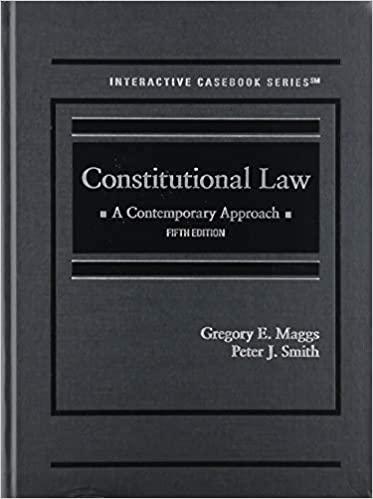Question
The Canadian Legal System, the Canadian Constitution and the Charter of Rights : Describe the levels of government in Canada, the federal and provincial system
The Canadian Legal System, the Canadian Constitution and the Charter of Rights:
- Describe the levels of government in Canada, the federal and provincial system of governments and explain their relationship to the Constitution
- What are the three branches of government, and what are their functions?
- Explain the significance of s.91 and s.92 of the Constitution Act, 1867
- Explain the significance of the Charter of Rights and Freedoms (Constitution Act, 1982)
- What is Procedural Law?What is Substantive law?
- What is public law? What is private law?
- What is the common law system of law? Where did it originate?
- What is the civil law system of law?Where did it originate?Where is it in effect in Canada?
- Contrast the civil system with common law system
- What is precedent? What is stare decisis?
- What is our Charter of Rights and what are its functions?
- What are some of the rights the Charter protects?
- What are the limitations on Charter rights?
- How are Charter rights protected? (Who protects them? How?)
- What is the standard of proof in a criminal case? In a civil case?
Alternative Dispute Resolution and Litigation:
- What is alternative dispute resolution (ADR)?
- What are the different forms of ADR and what are the differences between each?
- What are the positives and negatives of the different forms of ADR?
- What are the different levels of courts in Alberta? Who makes the decisions in each court?
- Identify each of the 5 divisions of Provincial Court in Alberta and explain the types of cases decided in each division and the decision-maker involved.
- What is the highest court of appeal in Canada?
- What are some of the benefits and detriments of litigation?
- What is a limitation period and why do we have them? What is the limitation period in Alberta? What is the ultimate limitation period in Alberta?
- What is a statement of claim? What would be the usual "reply" to a statement of claim?
- What is a counter claim?
- What are "costs"? How are they usually awarded?
Tort Law, Including Negligence and Intentional Torts:
- What is a tort?
- What are the two different kinds of liability in tort? What are the differences between them?
- When two people commit a tort together - what kind of liability will they have as between the two of them?
- What are the different kinds of damages in tort? Be able to distinguish between them and give examples of each kind.
- Describe the tort of nuisance.
- Describe the tort of trespass to property.
- Describe the tort of false imprisonment.
- Explain the differences between the torts of assault and battery.
- Describe the tort of passing off.
- What is the tort of negligence?
- What are the four steps to a negligence action? To what standard of proof do they need to be proven?
- Duty of Care: to whom do you owe a duty of care?
- Explain what is meant by the standard of care. What standard is a person judged by? How do you determine if the standard was breached?
- Explain what is meant by "causation."What is the test for causation?
- Describe what the courts look for in the element of "remoteness". What is the test for remoteness?
- What is the "thin skull rule"?
- What defenses are available to a defendant in a negligence action?
- What are the remedies in a tort action?
- What is Occupiers' Liability?
Contracts:
FORMATION
- What are the six elements of a contract?
- What is an offer?What is an invitation to treat? Explain and understand the differences between them.
- What ends an offer?
- What is revocation? When can an offer be revoked?
- What is acceptance? What is required in order for an offer to be properly accepted?
- What is consideration? What is a gratuitous promise?
- What promises can be enforceable without the legal element of consideration?
- What is capacity?
- Explain the general legal rules of intention to contract.
- What is the difference between express terms in a contract and implied terms of the contract?
- Explain the difference between "void" contracts and "voidable" contracts.
- What contracts MUST be written in order to be enforceable? What Act governs these types of contracts?
- Explain what it means when a contract is either void or voidable.
FACTORS AFFECTING CONTRACTS
- What factors would contribute to a contract being found: void; voidable; valid; illegal; unenforceable?
- How do the following factors affect the validity of a contract:
- Mistake:
- unilateral
- common
- mutual
- Misrepresentation
- negligent
- innocent
- fraudulent
- Duress - physical or financial "gun to the head" scenarios
- Undue Influence - addresses "special relationships" of vulnerability and dependence
- Unconscionable Transactions
1.Compare and contrast the common law system and the civil law system.
2.Explain the difference between offer and invitation to treat. Give an example of each.
3.What must be proven in order to have a contract set aside for misrepresentation?
4.Explain the difference between the standard of care that is applied to average members of society and the one that is applied to persons who have specialized training.
5.What are the steps to an action for the tort of negligence?
Step by Step Solution
There are 3 Steps involved in it
Step: 1

Get Instant Access to Expert-Tailored Solutions
See step-by-step solutions with expert insights and AI powered tools for academic success
Step: 2

Step: 3

Ace Your Homework with AI
Get the answers you need in no time with our AI-driven, step-by-step assistance
Get Started


